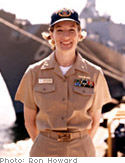Phenomenal Woman: An Officer And a Gentlewoman

Almost a year before the events of September 11, terrorists bombed the
U.S.S. Cole, killing 17 sailors. Somehow, Lt.
Commander Deborah Courtney managed to keep her head above water, oil, fire,
smoke and pandemonium.
It was a morning like any other, except that the perfect weather made people feel unusually energetic. The sky was a vivid blue and the sun seemed to light the tranquil water with tiny fires. As boats pulsed around the harbor, no one would have guessed that the scene was about to explode.This was not September 11, 2001, but almost a full year earlier: October 12, 2000. The Twin Towers still stood. The Pentagon was intact. America was at peace, and the U.S.S. Cole, a guided missile destroyer, was making a routine refueling stop in Yemen's port of Aden.
Shortly after 11 a.m., a sailor on watch noticed a white skiff approaching the ship. The two friendly-looking men on board waved to the sailor, and he waved back. Then the little boat slammed into the Cole, detonating a bomb that blew a gigantic hole in the ship's side, killing 17 sailors and wounding 37.
The ship filled with acrid smoke and thousands of gallons of oily black seawater poured into the main engine room, and nobody had a clue as to what was going on. It fell to the officers of the Cole, among them chief engineer Deborah Courtney, to make strategic choices that would keep the ship from sinking. If they failed, the Cole would have been the first ship to sink as a result of enemy action since World War II, more than 50 years ago.
Almost a year after the explosion, Courtney finds that the memory of the crisis is always with her, reflected in the way she trains the sailors on her new ship, the pleasure she feels when she runs into someone from the Cole, and the admiration that fills her when she remembers what they all accomplished there. "It's a bond that we're always going to have," she says. "There were 200 or however many heroes on that ship. The folks who were manning the guns topside for security. The folks who prepared the food and made sure that the drinks were cold. It sounds very minor—but if you don't give folks food, they're going to shut down. Everybody had a piece of what brought us home."
As this story goes to press, Deborah Courtney is serving as chief engineer aboard another combatant ship—part of the naval forces defending the United States against a shadowy enemy who is reported to have been behind the attack on her old ship. She'll be ready. She's faced the darkness before.



